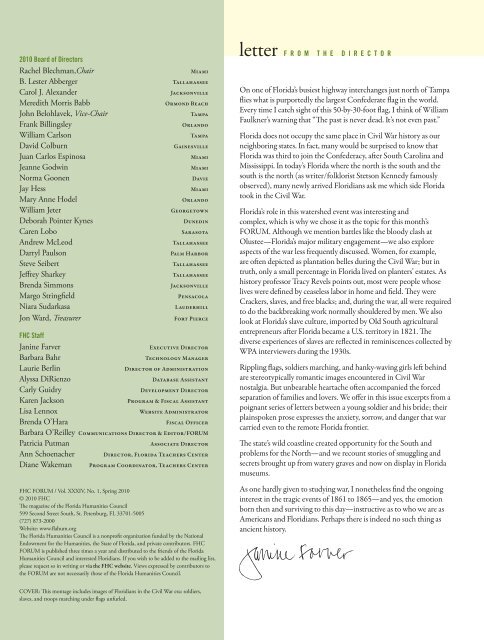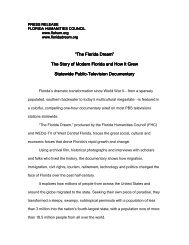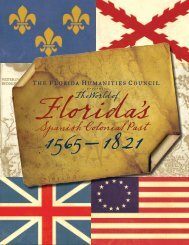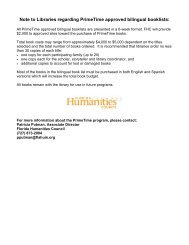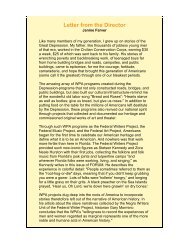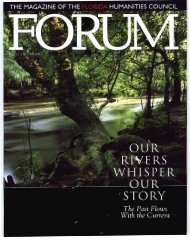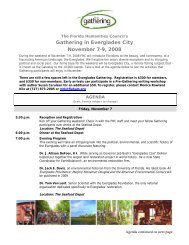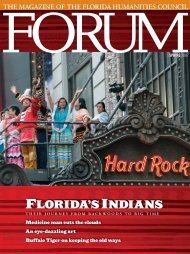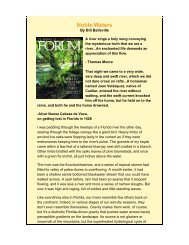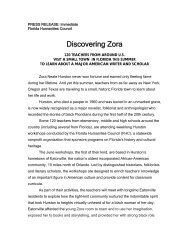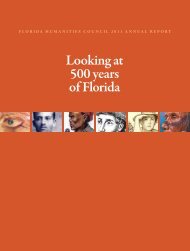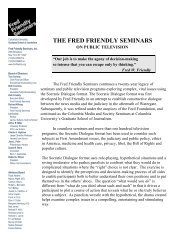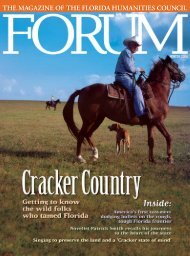when florida “Opened up the gates of hell” - Florida Humanities ...
when florida “Opened up the gates of hell” - Florida Humanities ...
when florida “Opened up the gates of hell” - Florida Humanities ...
You also want an ePaper? Increase the reach of your titles
YUMPU automatically turns print PDFs into web optimized ePapers that Google loves.
2010 Board <strong>of</strong> Directors<br />
Rachel Blechman,Chair Miami<br />
B. Lester Abberger Tallahassee<br />
Carol J. Alexander Jacksonville<br />
Meredith Morris Babb Ormond Beach<br />
John Belohlavek, Vice-Chair Tampa<br />
Frank Billingsley Orlando<br />
William Carlson Tampa<br />
David Colburn Gainesville<br />
Juan Carlos Espinosa Miami<br />
Jeanne Godwin Miami<br />
Norma Goonen Davie<br />
Jay Hess Miami<br />
Mary Anne Hodel Orlando<br />
William Jeter Georgetown<br />
Deborah Pointer Kynes Dunedin<br />
Caren Lobo Sarasota<br />
Andrew McLeod Tallahassee<br />
Darryl Paulson Palm Harbor<br />
Steve Seibert Tallahassee<br />
Jeffrey Sharkey Tallahassee<br />
Brenda Simmons Jacksonville<br />
Margo Stringfield Pensacola<br />
Niara Sudarkasa Lauderhill<br />
Jon Ward, Treasurer Fort Pierce<br />
FHC Staff<br />
Janine Farver Executive Director<br />
Barbara Bahr Technology Manager<br />
Laurie Berlin Director <strong>of</strong> Administration<br />
Alyssa DiRienzo Database Assistant<br />
Carly Guidry Development Director<br />
Karen Jackson Program & Fiscal Assistant<br />
Lisa Lennox Website Administrator<br />
Brenda O’Hara Fiscal Officer<br />
Barbara O’Reilley Communications Director & Editor/FORUM<br />
Patricia Putman Associate Director<br />
Ann Schoenacher Director, <strong>Florida</strong> Teachers Center<br />
Diane Wakeman Program Coordinator, Teachers Center<br />
FHC FORUM / Vol. XXXIV, No. 1, Spring 2010<br />
© 2010 FHC<br />
The magazine <strong>of</strong> <strong>the</strong> <strong>Florida</strong> <strong>Humanities</strong> Council<br />
599 Second Street South, St. Petersburg, FL 33701-5005<br />
(727) 873-2000<br />
Website: www.flahum.org<br />
The <strong>Florida</strong> <strong>Humanities</strong> Council is a nonpr<strong>of</strong>it organization funded by <strong>the</strong> National<br />
Endowment for <strong>the</strong> <strong>Humanities</strong>, <strong>the</strong> State <strong>of</strong> <strong>Florida</strong>, and private contributors. FHC<br />
FORUM is published three times a year and distributed to <strong>the</strong> friends <strong>of</strong> <strong>the</strong> <strong>Florida</strong><br />
<strong>Humanities</strong> Council and interested Floridians. If you wish to be added to <strong>the</strong> mailing list,<br />
please request so in writing or via <strong>the</strong> FHC website. Views expressed by contributors to<br />
<strong>the</strong> FORUM are not necessarily those <strong>of</strong> <strong>the</strong> <strong>Florida</strong> <strong>Humanities</strong> Council.<br />
COVER: This montage includes images <strong>of</strong> Floridians in <strong>the</strong> Civil War era: soldiers,<br />
slaves, and troops marching under flags unfurled.<br />
letter F r o m t H e D i r e C t o r<br />
On one <strong>of</strong> <strong>Florida</strong>’s busiest highway interchanges just north <strong>of</strong> Tampa<br />
flies what is purportedly <strong>the</strong> largest Confederate flag in <strong>the</strong> world.<br />
Every time I catch sight <strong>of</strong> this 50-by-30-foot flag, I think <strong>of</strong> William<br />
Faulkner’s warning that “The past is never dead. It’s not even past.”<br />
<strong>Florida</strong> does not occ<strong>up</strong>y <strong>the</strong> same place in Civil War history as our<br />
neighboring states. In fact, many would be surprised to know that<br />
<strong>Florida</strong> was third to join <strong>the</strong> Confederacy, after South Carolina and<br />
Mississippi. In today’s <strong>Florida</strong> where <strong>the</strong> north is <strong>the</strong> south and <strong>the</strong><br />
south is <strong>the</strong> north (as writer/folklorist Stetson Kennedy famously<br />
observed), many newly arrived Floridians ask me which side <strong>Florida</strong><br />
took in <strong>the</strong> Civil War.<br />
<strong>Florida</strong>’s role in this watershed event was interesting and<br />
complex, which is why we chose it as <strong>the</strong> topic for this month’s<br />
FORUM. Although we mention battles like <strong>the</strong> bloody clash at<br />
Olustee—<strong>Florida</strong>’s major military engagement—we also explore<br />
aspects <strong>of</strong> <strong>the</strong> war less frequently discussed. Women, for example,<br />
are <strong>of</strong>ten depicted as plantation belles during <strong>the</strong> Civil War; but in<br />
truth, only a small percentage in <strong>Florida</strong> lived on planters’ estates. As<br />
history pr<strong>of</strong>essor Tracy Revels points out, most were people whose<br />
lives were defined by ceaseless labor in home and field. They were<br />
Crackers, slaves, and free blacks; and, during <strong>the</strong> war, all were required<br />
to do <strong>the</strong> backbreaking work normally shouldered by men. We also<br />
look at <strong>Florida</strong>’s slave culture, imported by Old South agricultural<br />
entrepreneurs after <strong>Florida</strong> became a U.S. territory in 1821. The<br />
diverse experiences <strong>of</strong> slaves are reflected in reminiscences collected by<br />
WPA interviewers during <strong>the</strong> 1930s.<br />
Rippling flags, soldiers marching, and hanky-waving girls left behind<br />
are stereotypically romantic images encountered in Civil War<br />
nostalgia. But unbearable heartache <strong>of</strong>ten accompanied <strong>the</strong> forced<br />
separation <strong>of</strong> families and lovers. We <strong>of</strong>fer in this issue excerpts from a<br />
poignant series <strong>of</strong> letters between a young soldier and his bride; <strong>the</strong>ir<br />
plainspoken prose expresses <strong>the</strong> anxiety, sorrow, and danger that war<br />
carried even to <strong>the</strong> remote <strong>Florida</strong> frontier.<br />
The state’s wild coastline created opportunity for <strong>the</strong> South and<br />
problems for <strong>the</strong> North—and we recount stories <strong>of</strong> smuggling and<br />
secrets brought <strong>up</strong> from watery graves and now on display in <strong>Florida</strong><br />
museums.<br />
As one hardly given to studying war, I none<strong>the</strong>less find <strong>the</strong> ongoing<br />
interest in <strong>the</strong> tragic events <strong>of</strong> 1861 to 1865—and yes, <strong>the</strong> emotion<br />
born <strong>the</strong>n and surviving to this day—instructive as to who we are as<br />
Americans and Floridians. Perhaps <strong>the</strong>re is indeed no such thing as<br />
ancient history.


